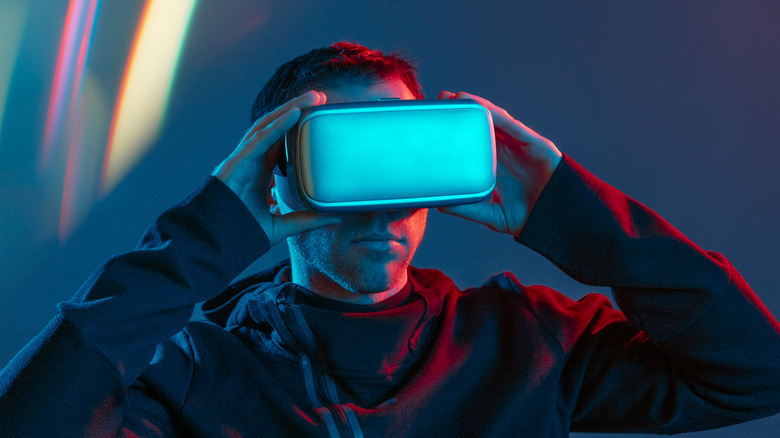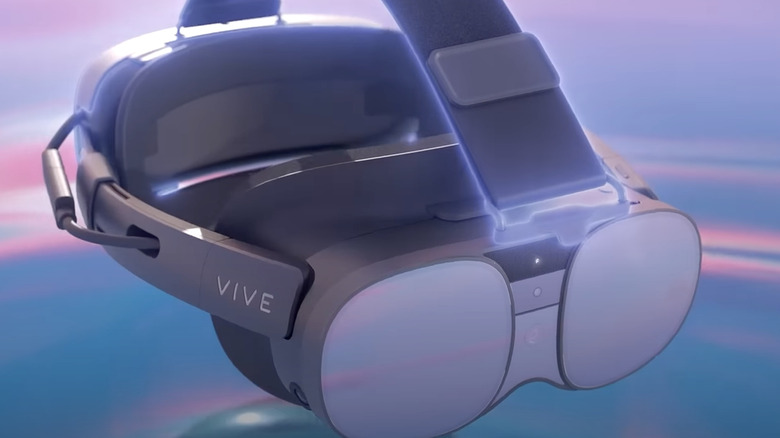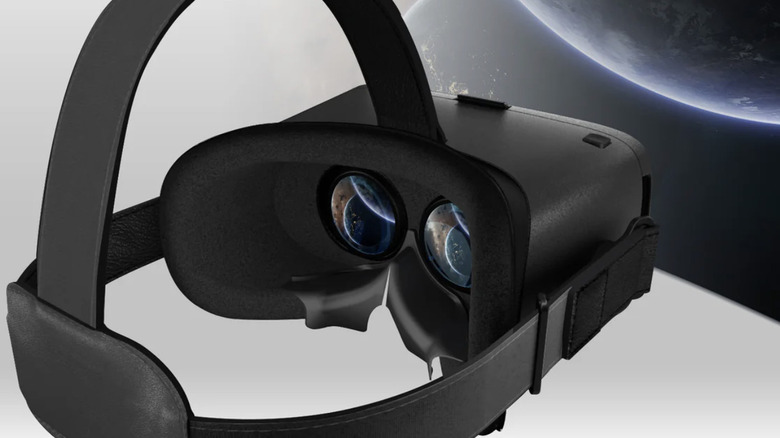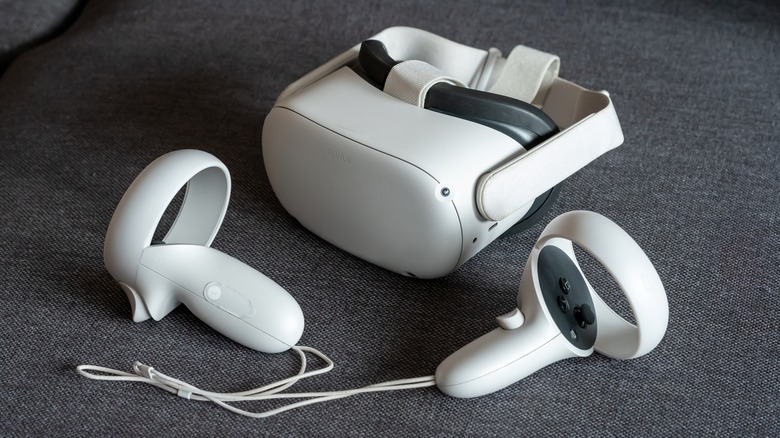3 Of The Worst VR Headsets To Buy For Beginners
We may receive a commission on purchases made from links.
It was not too long ago that the concept of virtual reality was only possible in the worlds of sci-fi novels, cartoons, and cinematic Hollywood blockbusters. But with the commercial release of the now discontinued Oculus Rift back in 2013, this cutting-edge innovation has significantly altered the way the general public interacts with technology. As virtual reality technology has grown over the last decade, so has the market. Increasing competition and a wider availability of products — from refined headsets and gear attachments to quality immersive video game content — has made it an ideal time to buy a VR headset.
However, with so many options, it can be confusing to figure out which headset is the best choice for you, especially if you're new to the world of virtual reality. Some factors to consider are the quality of the components, the level of comfortability, and compatibility with your other consoles. New buyers also need to consider what they'll be using the headsets for, as some equipment is better suited for immersive video gaming than others. Moreover, these headsets can cost quite a pretty penny, as seen with the 2024 launch of the Vision Pro, Apple's high-end augmented reality headset, with a whopping $3,499 price tag. Bearing all of these considerations in mind, we've taken the liberty of compiling a list of some of the worst virtual reality headsets to avoid, especially if you are just starting to use this technology.
The HTC Vive XR Elite may be too expensive and complex for beginners
The HTC Vive XR Elite is unique in that it incorporates an overall deconstructed, modular framework that allows for greater versatility as more components can be incorporated based on use. However, the headset's design also tends to veer on the smaller side, which means that it might be difficult to make necessary adjustments, particularly with the more compact eyewear. In contrast, the controllers are disproportionally larger in size and can feel somewhat clunky to use. Moreover, there's not much of a selection available in VIVEPORT, the headset's designated library of apps, and there have been some technical glitches that arise when trying to download games from the Steam platform. If one of your goals is to use the virtual reality headset and system to enhance your fitness experience, the XR Elite may prove a little too high maintenance given that the cloth covering for the user's face easily collects sweat and can be difficult to clean.
When HTC first launched the Vive XR Elite commercially, it was sold at a retail price of $1,100, which then fell to $900 by late summer of 2024. Since then the price has yet again fallen to under $750, and while that appears moderately priced, customers also have to factor in the potential expenses of other components like the $200 add-on fee for face and eye tracking or the Vive Ultimate Tracker Package (for a full-body experience), which costs an additional $499.
You pay for what you get with the simplified Destek VR Headset
In contrast to the HTC Vive XR Elite's larger price tag, the Destek virtual reality headset is significantly more affordable. The cost ranges form $34.99 to $49.99, depending on whether or not other components like the Bluetooth remote are included. This headset provides a simplified, bare-bones approach to virtual reality by enhancing the gadgetry already available from your smart phone. The headset balances durability with a light-weight feel and provides quality picture with anti-blue-light-coated HD lenses. While this may seem like the ideal platform for a beginner to explore immersive technology, the Destek does run into some frequently occurring issues.
The smart phone itself is prone to easily getting dislodged because there is no mechanism installed to keep it locked in beyond a layer of foam padding. Users have had trouble seeing the screen clearly because the lens will sometimes fog up due to the lack of adequate insulation. A thin, wobbly rubber covering is used to support the bridge of the nose and block out light; however, after using the headset for some time, it becomes very itchy and uncomfortable. Users have also complained about frequent connectivity issues with the Bluetooth remote depending on whether the smart phone operates on iOS or Android technology.
Using discontinued models like the Quest 2 may not be the best move for newbies
Another option beginners might consider is starting out with an older model so that they get a headset known for quality given the brand name, but at a cheaper price. Yet that may not always be the case, as seen with the recently terminated Meta Quest 2, formerly the Oculus Quest 2. In September 2024, Meta announced that it would be discontinuing both the Quest 2 and Quest Pro in order to make room for the launch of the Quest 3. Consumers can still purchase the Quest 2, which is available on Amazon with prices ranging from $329.00 to $443.44 depending on the packaging and components included. There's also a high likelihood that beginners using discontinued headsets will have more difficulty running up-to-date apps and add-ons as well as finding replacement parts if the headset breaks down.
The Quest 2 also has its own set of technical issues that may be frustrating for new virtual reality participants. For one, the material used in constructing the foam facial interface needed to be recalled when users experienced rashes and irritation on their skin. Frequent user problems such as the headset overheating, fickle tracking system, and rapidly depleting battery lifespans that can get as short as 90 minutes. Moreover, with the discontinuation of the Quest 2, users will have to bear in mind that a clock is winding down until support for the platform is removed. This was the case with the original Quest 1, when Meta announced it would receive its last update on April 30, 2024.



